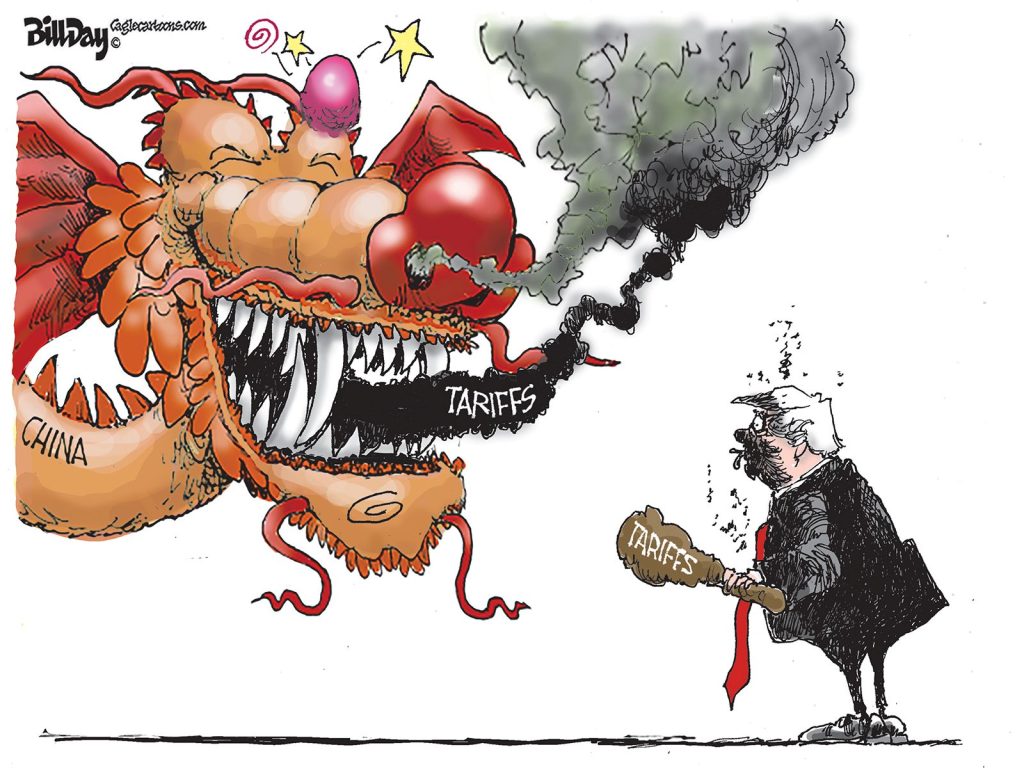Maybe our cynicism is showing, but the controversy about keeping secret the names of businesses that apply for EDGE tax freezes feels like a red herring.
More than anything, it seems a distraction that takes our attention off the need for serious reform of the economic development apparatus here that has underdelivered for more than a decade.
It is inarguable that something is seriously broken and we have no margin for error.
So far, changes to the economic development process are incremental in nature and do not produce the kind of disruptive innovation that is needed, but that is not to say that they are not useful starting points if indeed they are treated as starting points.
There is plenty of blame to go around for how we got here, and as we have blogged before, we have to resist the temptation to take sides based on personalities but advocate for policies that can turn around the lethargy that grips our economic performance.
Opinions Are Just That…Opinions
EDGE last week asked Tennessee Attorney General Herbert Slattery III if it, as a public board ultimately answerable to taxpayers, is a violation of the Tennessee Open Records Act for the city-county body to hide the names of companies applying for public incentives.
Ironically, the request comes at a time when Governor-elect Bill Lee pledged that a priority for his new administration is to strengthen the 61-year-old Tennessee Open Records Act which now has 563 exemptions, according to the Tennessee comptroller’s office. Each of the exemptions was passed by the Tennessee Legislature, usually in response to a special interest or politically connected supporter, and Mr. Lee rightly asserts that there are too many exemptions.
It’s been 10 years since the Open Records Act has been updated, and Mr. Lee said open government and transparency are among his nine priorities. The Legislature has an ad hoc committee working on the open records act, but since the super majority of our legislature has never placed any value on openness, we predict that reform will not be easy for the next governor, because he will undoubtedly bump up against a recalcitrant legislative body. Reform will require him to invest some of the good will during his honeymoon period to make the kind of changes he desires.
Back to the issue of secrecy in EDGE applications, it’s a solution looking for a problem.
It’s Worked This Way For Decades
Chamber types act like transparency is a serious deterrent to success in recruiting new companies, but it is difficult to see why.
First off, most prospects contact the Greater Memphis Chamber first if they are interested in exploring an opportunity in Memphis. The Chamber is a private, nonprofit organization and the state open records act does not apply to it, and for decades, it has used code words – or adopted the code words used by prospects.
For many years, Chamber officials have used the EDGE matrix to approximate – with a high degree of accuracy – what the term of a prospect’s tax freeze would be. And many times over decades, Chamber officials have taken prospects to meet with city and county mayors and their staffs, and these sessions are not covered by the state open meetings law either.
Second, representatives of the prospects can meet with EDGE staff at any time to discuss potential incentives, and these meetings are not subject to the Open Meetings Law, and documents are routinely taken by up by prospects so there is no Open Records Act recourse. For that matter, they can meet with the chair of EDGE or any single member of the board without violating state law.
In other words, there is already the potential for plenty of secrecy within the system, and regardless of what the state attorney general opines, EDGE should opt to be as open as possible. After all, it has been recognized as a leader in transparency by Good Jobs First, an organization that opposes large-scale public giveaways to corporate America.
Transparency Is Key
The staff of EDGE has been justifiably proud of the national recognition it received for transparency and as a leader for similar agencies that do similar work, it should protect and advocate for continued transparency in applications since there are plenty of ways within the present system to protect confidentiality if it is needed.
Third, while the Little Rock firm that produced a report for the Chamber about problems within the economic development process here said the lack of secrecy was an obstacle to success here in attracting new companies and jobs, it felt more like a consultant delivering what a client wanted to hear. After all, there have been tax freezes for decades without secrecy and with the trend line moving in the right direction and it didn’t seem to be a problem in closing deals.
Here’s the thing: anytime public taxes are being invested in companies – and that essentially is precisely what the PILOTs do – the public deserves to know as much as possible and as soon as possible.
It is our understanding that EDGE president Reid Dulberger is not an advocate for the change in policy. He is right.
The Criteria Are Clear
Meanwhile, we remain a city and county in pursuit of a clear economic development plan of action. We were reminded last week about how all the comments made by economic development in the wake of Amazon eliminating Memphis from the 20 finalists in the end rang hollow. The reminder came when Amazon selected Nashville for 5,000 jobs for its operations hub.
We don’t bring this up to compare Nashville and Memphis, because as we have frequently said, no city in the Southeast U.S. is competing these days with our state capital in its accelerated economic growth.
We bring it up because in considering which city to locate these 5,000 jobs, Amazon once again set out its criteria for cities seeking its skilled jobs. They were similar to the ones issued before the company launched its sham process to select sites for its second headquarters (and as it turned out, its third as well).
As we suggested previously, if Memphis and Shelby County were serious about competing for better jobs, it would have taken the Amazon criteria – which are not too different from the criteria of other major companies – and laid out a plan to meet those requirements.
Instead, we essentially went back to business as usual despite stated concerns that the economy is underperforming and that we aren’t in the hunt for major companies’ headquarters, even regional ones.
Getting Into The Game
We did not engage in the serious post mortem that could have yielded new insights and a clear-eyed analysis of where we are and what it would take to get us to where we want to be. In its place we seem to yield to pointing fingers and placing blame, which essentially meant that we made no progress in a widely shared agenda for moving the economy ahead.
Chief among what Amazon said it was looking for that led it to choose Nashville from 18 cities were a thick labor market for tech jobs (especially younger, college-educated workers), a high-quality university, affordable air transportation to major cities, and a quality of life attractive to technology workers.
On the same day as the Amazon announcement, EY (formerly Ernest & Young) said it was opening a 600-employee office in Nashville that will concentrate on tech-enabled, tax-managed services, software development, and design and testing. We mention this for what EY said it was looking for: an educated workforce and young professional talent.
Put simply, if Memphis cannot find a way to compete in the technology economy, it will have to adjust to being on the list of also-run American cities that were unable to measure up in an economy based on innovation and knowledge.
That’s the mandate for Memphis and Shelby County now, and we really don’t have time to spend on extraneous issues like secrecy for companies applying for tax holidays.
***
Join us at the Smart City Memphis Facebook page for daily articles, reports, and commentaries relevant to Memphis.






I agree. Im supportive of code names just to get it out of the way but it’s not a big deal either way. Everyone keeps punting on the real issues of economic and workforce development in support of the status quo which consists of listening to the same people…..
Its rather stunning that the Amazon Road map has not been referenced as a guide to local economic development work. It seems so straight forward.
All this stupid secrecy. So typical of Memphis. We never learn.
Memphis’ destiny is to perpetually remain an “also-ran” city unable to compete in anything.
Seriously, did we not learn anything from the Amazon criteria? This is not good. It’s so embarrassing.
Just look at all the outstanding success in Nashville!
As I mentioned in a previous thread, I think we need be cautious / careful with the “Amazon Model”. The Amazon bonanza was rigged from the get go. NYC, with is costs, outdated and crowded transit system, low, LOW unemployment and a shrinking affordable housing market makes little sense to me. DC, pure politics and I would have bet $1000 6 months ago that they would “win”. Projects like Amazon are once-in-a-lifetime as we should focus on what the vast majority of HQ expansion and relocaters are seeking…low costs, access to airports / talent / infrastructure / markets, incentives, talent and lifestyle (housing, parks-trails, pro sports, shopping, low crime, schools, etc ie: recruitment and retention amenities. Memphis has a ton of strengths that need to be elevated and promoted as well as a bunch of weaknesses, that need to be managed and or fixed..at the end of the day, in a hyper, HYPER competitive world of site selection, how do you compare, how can you compete, how can you adjust and what will this market look like in 5, 10, 20 years from now, how are you trending? I remain bullish that Memphis can and will compete, for the projects that they should be competing for.
Good points, DJ, but amazon’s requirements aren’t different from many companies these days. Either we get in the game or get out. That said, what are the strengths that we need to be emphasizing to get better jobs.
http://thememphiseconomy.com/news/2017/11/9/we-are-not-lost-amazon-gave-us-a-map
I beg to differ and don’t want to get into a SCM back and forth rant with anybody, but, corporate relo types are looking for exactly what I outlined…low operating costs, talent, access to air / talent / markets / prospects / amenities, lifestyle and incentives. A 50 – 500 person corporate HQ expansion or relocation will have much different desires v Amazon. This “niche” is what we as a community should focus on…and PS, how much would an “Amazon Friendly” transit system cost? $60-75,000,000 was a number I saw. Basic question, what HQ needs to be here or would benefit from being here? Medical related to take advantage of access to St. Jude, RegONE, Baptist, Medtronic, S&N, etc?? We sit in the middle an Ag’ville…seed, crop, agriculture related enterprises?? Transportation office and back office?? Are there these type of orgs / HQ’s in high cost markets like NYC, Chicago, DC, San Fran, LA, Philly, etc?? I say YES! Our +’s…central location, low operating cost environment, proximity to MS river, MEM, 40/55, rail, weather, amenities…Our -‘s…crime and poverty and the perception, real or blown up, that all of that carries, our airport. Are we able to compete with like cities? OKC, Louisville, Milwaukee, KC, Omaha, Tulsa, New Orleans?? What is the compelling BUSINESS REASON for me to put my company here?